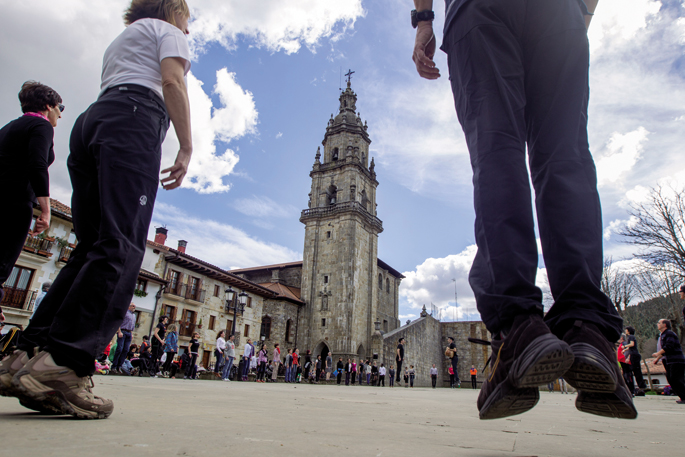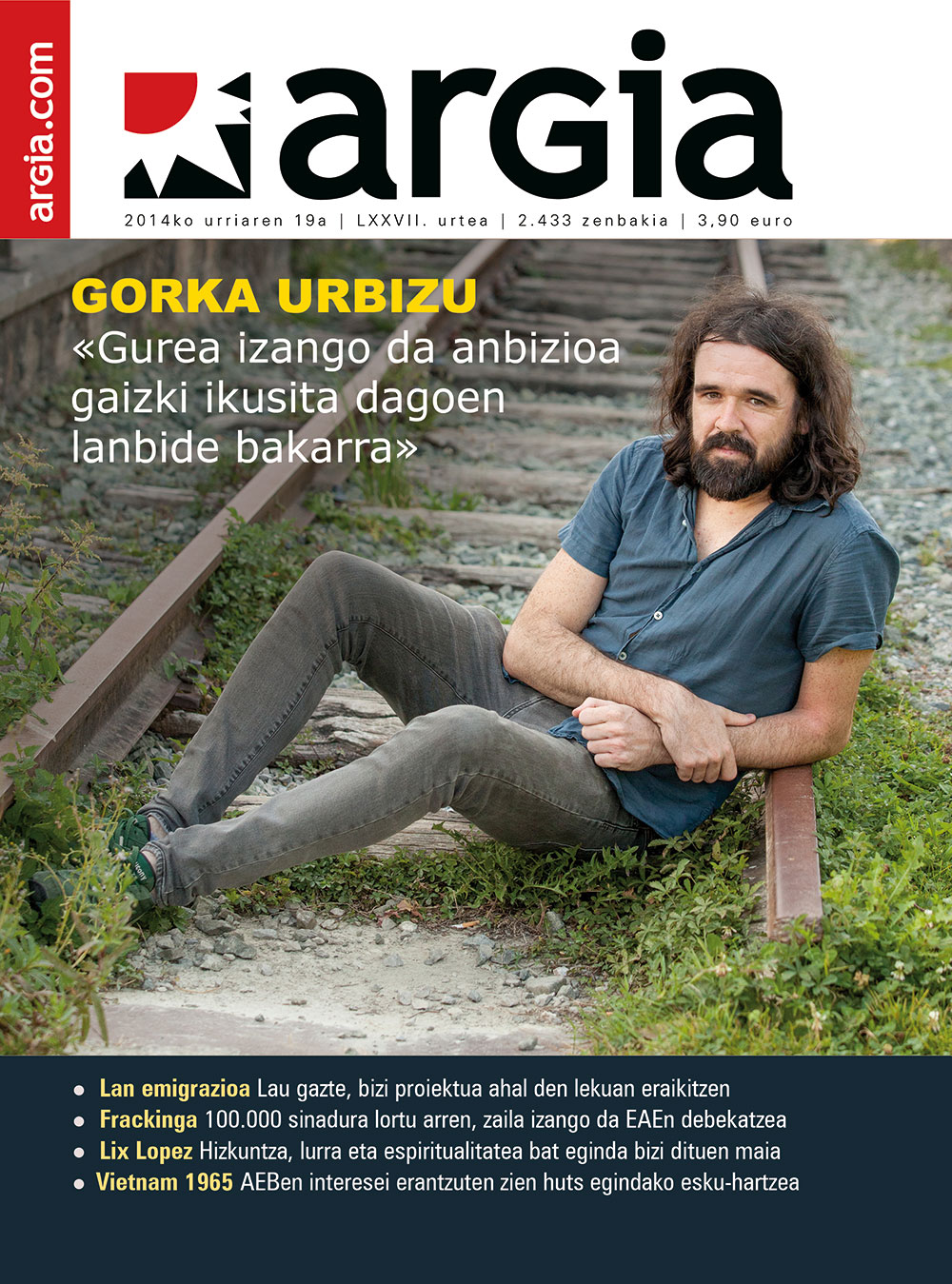A step to reclaim the social aspect of dance
- The Aiko group launched the Dantzaldi ibiltaria initiative 7 years ago, in which they have formed and assembled over 2,000 dantzaris and dance enthusiasts around the Basque dances. This year’s edition brings news, for example, a special seminar aimed at the students of the School of Magisterium of the UPV. The courses that have become common will be taught in Bilbao, Donostia-San Sebastián, Galdakao, Durango, Ondarroa, Markina, Gernika, Sopela and Pamplona/Iruña. The Bizkaia aretoa space in Bilbao will host the last open programme of the course, both for beginners and for those with experience. On the Ribera Market, a pilgrimage will be held every Friday.

Sabin Bikandi is a member of Aiko's musical group and one of the founders of ibiltaria Dantzaldi. He graduated in Ethnomusicology from the University of London and is a drummer and composer of the Municipal Band of Txistularis in Bilbao, being the singer of most of the songs played by the Aiko group. The Dantzaldi Ibiltaria program started in 2008 and has since received 2,000 dancers in courses, workshops and seminars. “But that’s not our league,” says Bikandi, “we’re not in numbers. We know where our place is. We are satisfied because we have more and more resources and amateurs are more, above all, like us, the ones who come to enjoy. We have had the opportunity to spread the Itinerant Dance, because more and more people have supported the initiative.”
Aiko’s Itinerant Dance began 7 years ago with the courses taught in the villages. Since then, it has grown and grown. Today, in addition to Bilbao, the courses will also be held in Donostia and Pamplona, and “this is important”, according to Bikandi, “as it is also important to have a space and dignified equipment offered by the Bizkaia room in Bilbao”. At Donostia-San Sebastian, shows are offered at the Victoria Eugenia Theatre, at the Bekozini Hall in Ondarroa and at the Plateruena Kafe Antzokia in Durango.
The fact of joining in half a glass or in the meals and romerías that are made to unite the students makes Dantzaldi Ibiltaria a social initiative. “For us it is social dance, which is done to relate. The pilgrimage has always been a meeting point. Although this celebration has changed a little, ours is a proposal for a meeting and a relationship. The main goal of Dantzaldi Ibiltaria is to create spaces to be together, to speak or to go in the juerga,” says the musician.
The sessions of Aiko are fully taught in Basque and although most of the attendees are Euskaldunes, “we managed to gather people of different sensibilities in a natural way, we have been surprised by the Basque technicians. There are also Catalans and Germans among us, and that also benefits the Basques, because it makes us feel that we are not alone. We see that there are people as fond as we are and knowing that is a nice thing.”
New dance teachers
Aiko and the UPV/EHU have just signed an agreement to create a seminar aimed at undergraduate students from the School of Teaching in Leioa. Through this initiative, future teachers will be trained in the world of Basque music and dance. The promotion of music and traditional dance as a cultural asset is one of the objectives established in the agreement between Aiko and the UPV/EHU, contributing to the transmission of knowledge related to folklore and maintaining the traditional cultural heritage through recording, sheet music, musical instruments, costumes, etc. This initiative also aims to make traditional Basque music and dance a normal leisure activity. Although it is a course specifically developed for the students of the School of Teaching, it will also be open to students of other faculties. “As we are dancers, we walk step by step. We have organised a 25-hour seminar, once a week, until December. See what happens, let people know us,” says Bikandi.
In short, the commitment of Aiko and Dantzaldi Ibiltaria in this seminar is to normalize the teaching of dance and Basque music. “I know the normalization of the Basque Country closely and I know that we have a lot to do in the area of dance. In many towns of Euskal Herria it is easier to learn salsa, merengue or belly dance than to learn Basque dances,” said Bikandi. “We don’t have school to train dance teachers. So far, thanks to the voluntary work of some, dances and Basque music have been maintained. And less bad! But today’s society demands other things, the transmission of traditional dance cannot be left to volunteers. This nostalgic and romantic point of view is disappearing, both in the transmission of language and in the dance. It's one thing to know how to dance and another to know how to teach dance. We need Basque Dance Schools,” the creator claimed.
Aiko has created his own teaching methodology, and as creators of traditional Basque music, they have cultivated the fondness for Basque dance. Always with playful intent. “To dance in our culture is to connect with music. In this respect, I believe that we are contributing something. And in the street, in the village, we want to spread dance, lose shame and enjoy it. In today's society, it seems that to be a dancer you have to be a professional, which is necessarily a specialist thing. We want to democratize dance, and for that we have resorted to ancient dance, traditional dance, not academic dance. Not because I'm older, but because it's easy for everyone."
The idea that we in the dance world often repeat is that dance is ephemeral. The Elhuyar dictionary gives as a counterpart to "ephemeral" English: ephemeral, destructive, perishable, ephemeral, ephemeral, perishable, perishable, ilaun. I don't remember who I first read that idea... [+]
Transmisioa eta dantza taldeetako erreleboa aztertu nahi izan dugu Dantzan Ikasi topaketetan, eta gazte belaunaldiek lan egiteko ereduak ezagutu nahi izan ditugu “Gazteen parte-hartzea euskal dantzan” mahai inguruan: Eder Niño Barakaldoko... [+]
Aste hondar honetan euskal dantzen hiriburu bilakatu da Hendaia. Akelarre dantza talde hendaiarraren 50. urtemugaren testuinguruan, Lapurdi, Baxe Nafarroa eta Xiberoako hamasei dantza talde elkartu ditu bertan Iparraldeko Dantzarien Biltzarrak.
























